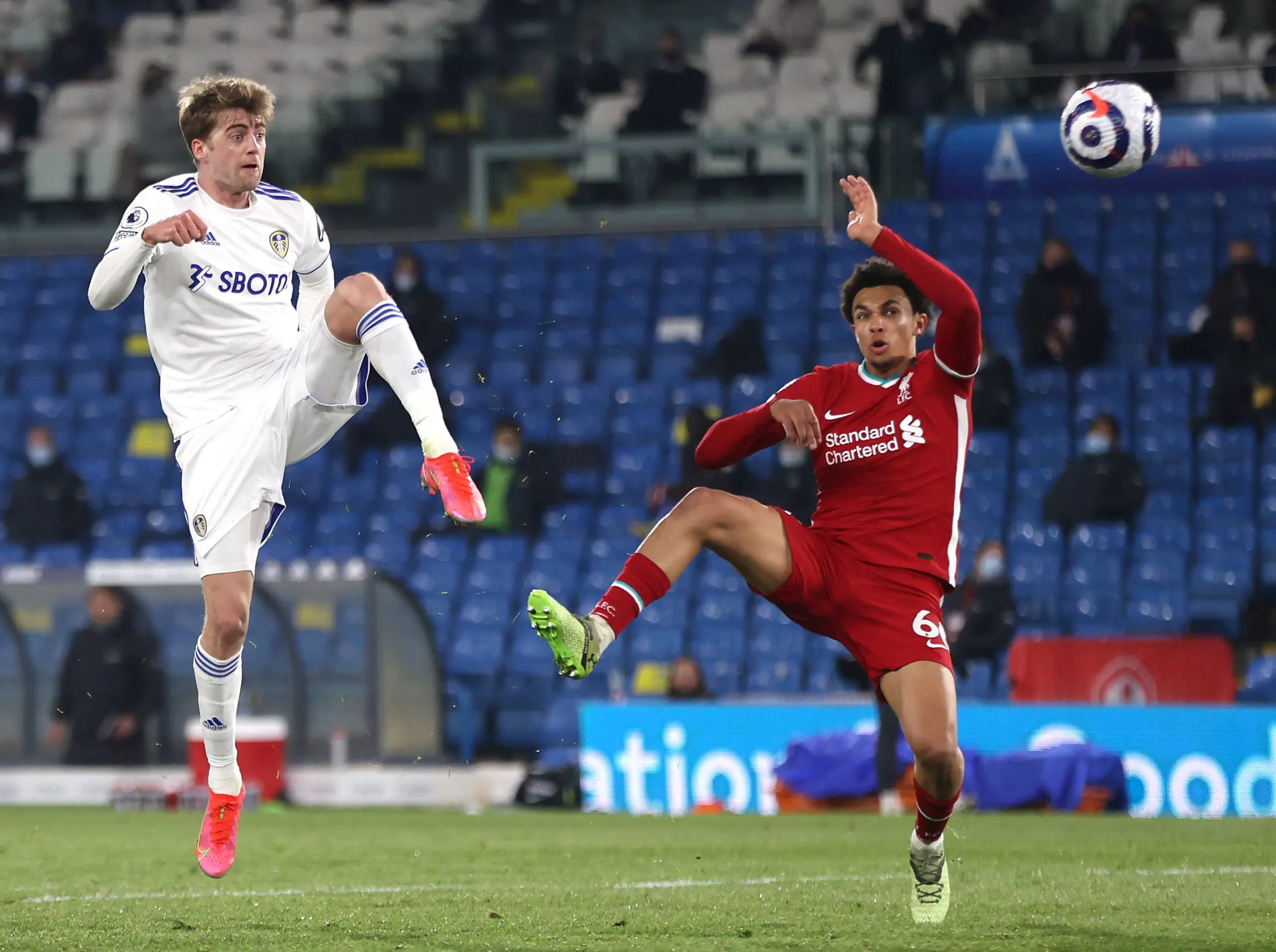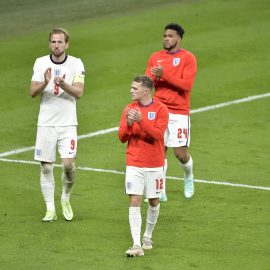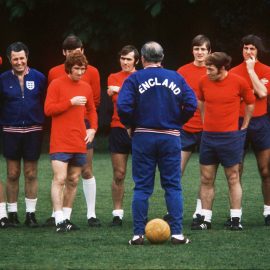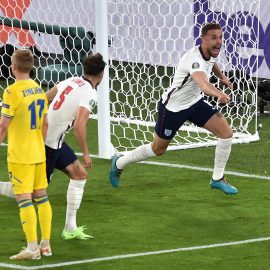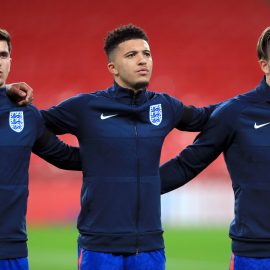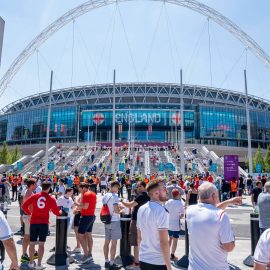The response from fans and media to England’s defeat on penalties to Italy on Sunday night has largely been encouraging. No hounding of referees into early retirement and a life on the run from the press. No plastering of Roy Hodgson’s head onto pizza or pasta or some Italian foodstuff. No or very little hooliganism or racism. Just an acknowledgement that England were lucky to take Italy to penalties and that England must learn to retain possession much, much better than they do now.
In the second period of extra time yesterday England completed only fifteen passes. One completed pass a minute. That at international level is a disgrace. That would be a disgrace for a Sunday league side still recovering from their goalkeeper’s stag night the night before. For the entire tournament England’s possession statistics are damning. They had less than 50% possession in every game they played. Only Ireland and Greece averaged less possession for each match.
Now possession isn’t everything. Russia and Holland are in the top 5 for keeping possession, Greece and England in the bottom 3. Chelsea won the Champions League when out-passed, out-shot and out-gunned in every department except the scoreline. But more often than not teams who pass the ball well and keep possession well will do better than sides that don’t. None of the top sides at club or international level are long ball sides or sides who pass the ball poorly.
Seeing the England team, full to the brim with players from top club sides constantly giving the ball away and adding pressure to their already besieged defence was a distressing but not uncommon sight. This has been a failing for years but yesterday it may well reached its nadir with the one completed pass a minute in the second period of extra time.
In the aftermath of last night’s defeat what has to be the prerogative is to coach, nurture and bring through talented young players who are capable of passing the ball and retaining possession not just in easy qualifiers against Andorra but in high pressure situations. In World Cup quarter-finals, in close games, late in games, in extra-time, even when players are tired and hurting.
For too long England have had this siege mentality in games, where they neglect keeping possession in favour of barricading themselves in their own penalty area. This is a trend that goes back centuries, to the times when games of football would take place between villages, with the whole village being a pitch and the goals being gates at the entry and exit of these villages. People would defend their gate to the hilt to salvage local pride. Centuries later, England are camped in their own half defending valiantly against Italian pressure.
This culture has to largely stop. We should take the good defensive organisation that Roy Hodgson has implemented in the tournament, but not subject that to the intense pressure it faced under the gloriously sensuous probings from Andrea Pirlo yesterday.
Pirlo’s wonderful ball control, capacity for always finding space and ability to sniff out and correctly execute pass after pass should be an inspiration to young footballers, who should they come through hopefully won’t be misused like Paul Scholes was. And if a club side like Swansea can pass the ball superbly, so can everyone else with the right coaching and attitude.
As regards coaching, Roy Hodgson did an excellent job at the Euros. Though the playing style was at times primitive and dull, he did an excellent job given how he was appointed less than a month before the Euros started and inherited the worst England side in 20 years, a squad further weakened by injury and surrounded by the John Terry/Rio Ferdinand furore.
Considering those problems, for England to be a penalty shoot-out away from the semi-finals was some achievement, however fortunate England were to even get to penalties against the clearly superior Italians. His tactics were mostly effective, his substitutions (especially against Sweden) were original in that he didn’t protect slender leads with more defensive players off the bench, instead using the likes of Theo Walcott and Alex Oxlade-Chamberlain to push back the opposition and pose a bigger threat on the counter. His decision to pick John Terry, while in many ways unsavoury was rewarded with some excellent displays by Terry on the pitch.
Hodgson has more than earned the right to lead England to at least the 2014 World Cup. He appears popular and so far has done a good job with limited resources. His experience coaching all around the world is both unusual and very welcome for a British coach. Also despite the apparent primitive style his sides adopt and his comment to the media that ‘he doesn’t see possession stats as being important’ he must surely recognise the importance of keeping the ball and not constantly conceding possession and inviting pressure.
The next group of players who look set to play for England will hopefully be much better in possession than the current group of players. In defence the likes of Phil Jones, Chris Smalling, Steven Caulker and Kyle Walker are all young, fairly cultured players who are used to playing out from the back for their clubs.
The next batch of midfielders in the likes of Jack Wilshere, Tom Cleverley and Josh McEachran are all creative types renowned for their passing ability. Wilshere has already excelled for Arsenal, Cleverley showed a lot of promise at Man United and was a big miss for them throughout the season while Mc Eachran is very highly rated by Chelsea. Others like Jake Livermore, Jack Rodwell and even Tom Huddlestone are potentially excellent defensive midfielders. With Oxlade-Chamberlain, Victor Moses, Daniel Sturridge and Wilfred Zaha developing talents in attacking wide positions the talent is clearly there and the personnel for a good passing game hopefully in place.
What will be difficult is integrating these young players with the now very hollow sounding ‘golden generation’. Hodgson has already indicated that the likes of Gerrard, Terry and Ashley Cole will stay in the side for the foreseeable future. They were good performers at the Euros and a sprinkling of experience is always valuable. But it’s important they don’t hold back the development of the younger players, even at the expense of the odd bad result. Youth needs to thrive, be given experience and allowed to make the odd mistake if England are to successfully rebuild.
Hodgson’s experience in coaching abroad will also hopefully make the idea of English players and coaching earning their crust abroad in the future more of a palatable option. Not one English player in the Euro 2012 squad played outside of England which is ridiculous. England would be far better at international level if players sampled other cultures, other ways of playing the game.
Gone are the days when domestic leagues had no foreign players. English players becoming more open to playing abroad and English coaches following the lead of Hodgson, Terry Venables, Bobby Robson (though not following Steve McClaren’s lead in dodgy foreign accents) and others in coaching abroad would be extremely beneficial and give players and coaches very valuable experience that will help the England side immeasurably.
England will never win any honour of note if they continue to be wasteful and profligate in possession of the football. That’s not to say we should play like Spain or never play a long pass. That would be nonsense. But the best sides keep possession well, pass the ball well and have systems in place which produce fine players and fine coaches.
England have the talent and the personnel to be a successful international side. With the FA opening the long overdue St Georges Park in Burton which will help teach young players and coaches and in Hodgson an experienced, successful coach at the helm England’s future is bright. But the England side has to be carefully rebuilt, and ball retention emphasised above almost everything else if the dreadfully clichéd ‘Three Lions’ will be roaring triumphantly in future years.
Add Sportslens to your Google News Feed!
